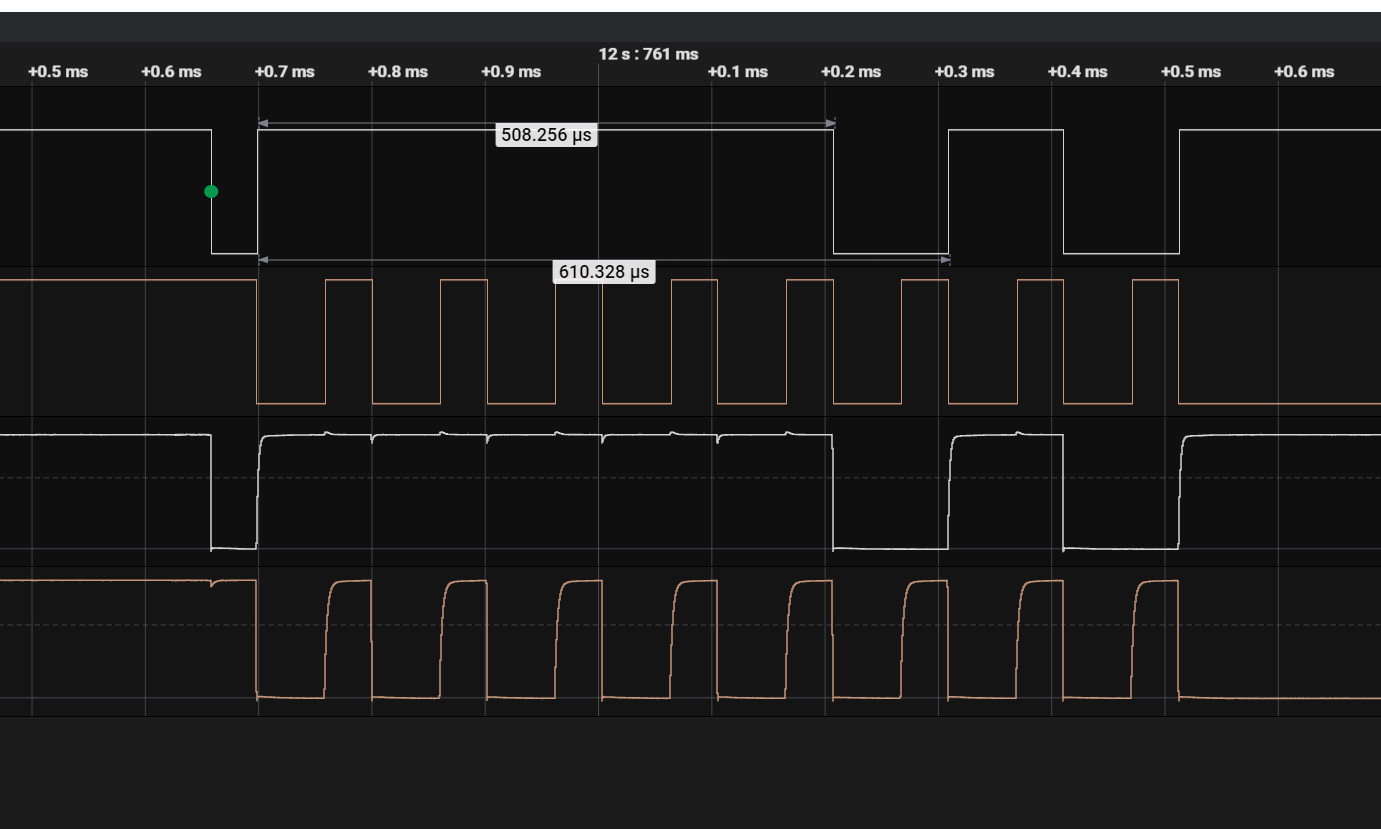This question has been "self answered". Please see answer below.
I am trying to communicate with SMBUS Master and Slave configuration on both STM32G070RB (NUCLEO Boards). So the master sends the address signal correctly to the slave. I can see the slave address on the address match code register on the slave. But the slave couldn't get the data from the master because the master is also stuck on the address stage because it couldn't get the ack signal from the slave. You can check the graph below. After sending the address SCL pin stays low until the timeout. So HAL_SMBUS_GetState is never returning HAL_SMBUS_STATE_READY. How can I solve this issue?
Master Code:
int main(void)
{
HAL_Init();
SystemClock_Config();
MX_GPIO_Init();
MX_I2C1_SMBUS_Init();
while (1)
{
if (HAL_SMBUS_Master_Transmit_IT(&hsmbus1, (125U << 1), &txData,
1, SMBUS_FIRST_AND_LAST_FRAME_NO_PEC) != HAL_OK) {
HAL_GPIO_TogglePin(LED_GREEN_GPIO_Port, LED_GREEN_Pin);
}
while (HAL_SMBUS_GetState(&hsmbus1) != HAL_SMBUS_STATE_READY);
HAL_Delay(500);
}
}
void SystemClock_Config(void)
{
RCC_OscInitTypeDef RCC_OscInitStruct = {0};
RCC_ClkInitTypeDef RCC_ClkInitStruct = {0};
HAL_PWREx_ControlVoltageScaling(PWR_REGULATOR_VOLTAGE_SCALE1);
RCC_OscInitStruct.OscillatorType = RCC_OSCILLATORTYPE_HSI;
RCC_OscInitStruct.HSIState = RCC_HSI_ON;
RCC_OscInitStruct.HSIDiv = RCC_HSI_DIV1;
RCC_OscInitStruct.HSICalibrationValue = RCC_HSICALIBRATION_DEFAULT;
RCC_OscInitStruct.PLL.PLLState = RCC_PLL_ON;
RCC_OscInitStruct.PLL.PLLSource = RCC_PLLSOURCE_HSI;
RCC_OscInitStruct.PLL.PLLM = RCC_PLLM_DIV1;
RCC_OscInitStruct.PLL.PLLN = 8;
RCC_OscInitStruct.PLL.PLLP = RCC_PLLP_DIV2;
RCC_OscInitStruct.PLL.PLLR = RCC_PLLR_DIV2;
if (HAL_RCC_OscConfig(&RCC_OscInitStruct) != HAL_OK)
{
Error_Handler();
}
RCC_ClkInitStruct.ClockType = RCC_CLOCKTYPE_HCLK|RCC_CLOCKTYPE_SYSCLK
|RCC_CLOCKTYPE_PCLK1;
RCC_ClkInitStruct.SYSCLKSource = RCC_SYSCLKSOURCE_PLLCLK;
RCC_ClkInitStruct.AHBCLKDivider = RCC_SYSCLK_DIV1;
RCC_ClkInitStruct.APB1CLKDivider = RCC_HCLK_DIV1;
if (HAL_RCC_ClockConfig(&RCC_ClkInitStruct, FLASH_LATENCY_2) != HAL_OK)
{
Error_Handler();
}
}
static void MX_I2C1_SMBUS_Init(void)
{
hsmbus1.Instance = I2C1;
hsmbus1.Init.Timing = 0xE010A9FF;
hsmbus1.Init.AnalogFilter = SMBUS_ANALOGFILTER_ENABLE;
hsmbus1.Init.OwnAddress1 = 2;
hsmbus1.Init.AddressingMode = SMBUS_ADDRESSINGMODE_7BIT;
hsmbus1.Init.DualAddressMode = SMBUS_DUALADDRESS_DISABLE;
hsmbus1.Init.OwnAddress2 = 0;
hsmbus1.Init.OwnAddress2Masks = SMBUS_OA2_NOMASK;
hsmbus1.Init.GeneralCallMode = SMBUS_GENERALCALL_DISABLE;
hsmbus1.Init.NoStretchMode = SMBUS_NOSTRETCH_DISABLE;
hsmbus1.Init.PacketErrorCheckMode = SMBUS_PEC_DISABLE;
hsmbus1.Init.PeripheralMode = SMBUS_PERIPHERAL_MODE_SMBUS_HOST;
hsmbus1.Init.SMBusTimeout = 0x0000830D;
if (HAL_SMBUS_Init(&hsmbus1) != HAL_OK)
{
Error_Handler();
}
if (HAL_SMBUS_ConfigDigitalFilter(&hsmbus1, 0) != HAL_OK)
{
Error_Handler();
}
}
static void MX_GPIO_Init(void)
{
GPIO_InitTypeDef GPIO_InitStruct = {0};
__HAL_RCC_GPIOC_CLK_ENABLE();
__HAL_RCC_GPIOF_CLK_ENABLE();
__HAL_RCC_GPIOA_CLK_ENABLE();
__HAL_RCC_GPIOB_CLK_ENABLE();
HAL_GPIO_WritePin(LED_GREEN_GPIO_Port, LED_GREEN_Pin, GPIO_PIN_RESET);
GPIO_InitStruct.Pin = LED_GREEN_Pin;
GPIO_InitStruct.Mode = GPIO_MODE_OUTPUT_PP;
GPIO_InitStruct.Pull = GPIO_NOPULL;
GPIO_InitStruct.Speed = GPIO_SPEED_FREQ_HIGH;
HAL_GPIO_Init(LED_GREEN_GPIO_Port, &GPIO_InitStruct);
}
Slave Code:
int main(void)
{
HAL_Init();
SystemClock_Config();
MX_GPIO_Init();
MX_I2C1_SMBUS_Init();
HAL_SMBUS_EnableListen_IT(&hsmbus1);
while (1)
{
if(HAL_SMBUS_Slave_Receive_IT(&hsmbus1, &rxData, 1, SMBUS_FIRST_AND_LAST_FRAME_NO_PEC) != HAL_OK)
{
Error_Handler();
}
while (hsmbus1.State != HAL_SMBUS_STATE_READY);
}
}
void SystemClock_Config(void)
{
RCC_OscInitTypeDef RCC_OscInitStruct = {0};
RCC_ClkInitTypeDef RCC_ClkInitStruct = {0};
HAL_PWREx_ControlVoltageScaling(PWR_REGULATOR_VOLTAGE_SCALE1);
RCC_OscInitStruct.OscillatorType = RCC_OSCILLATORTYPE_HSI;
RCC_OscInitStruct.HSIState = RCC_HSI_ON;
RCC_OscInitStruct.HSIDiv = RCC_HSI_DIV1;
RCC_OscInitStruct.HSICalibrationValue = RCC_HSICALIBRATION_DEFAULT;
RCC_OscInitStruct.PLL.PLLState = RCC_PLL_ON;
RCC_OscInitStruct.PLL.PLLSource = RCC_PLLSOURCE_HSI;
RCC_OscInitStruct.PLL.PLLM = RCC_PLLM_DIV1;
RCC_OscInitStruct.PLL.PLLN = 8;
RCC_OscInitStruct.PLL.PLLP = RCC_PLLP_DIV2;
RCC_OscInitStruct.PLL.PLLR = RCC_PLLR_DIV2;
if (HAL_RCC_OscConfig(&RCC_OscInitStruct) != HAL_OK)
{
Error_Handler();
}
RCC_ClkInitStruct.ClockType = RCC_CLOCKTYPE_HCLK|RCC_CLOCKTYPE_SYSCLK
|RCC_CLOCKTYPE_PCLK1;
RCC_ClkInitStruct.SYSCLKSource = RCC_SYSCLKSOURCE_PLLCLK;
RCC_ClkInitStruct.AHBCLKDivider = RCC_SYSCLK_DIV1;
RCC_ClkInitStruct.APB1CLKDivider = RCC_HCLK_DIV1;
if (HAL_RCC_ClockConfig(&RCC_ClkInitStruct, FLASH_LATENCY_2) != HAL_OK)
{
Error_Handler();
}
}
static void MX_I2C1_SMBUS_Init(void)
{
hsmbus1.Instance = I2C1;
hsmbus1.Init.Timing = 0xE010A9FF;
hsmbus1.Init.AnalogFilter = SMBUS_ANALOGFILTER_ENABLE;
hsmbus1.Init.OwnAddress1 = 250;
hsmbus1.Init.AddressingMode = SMBUS_ADDRESSINGMODE_7BIT;
hsmbus1.Init.DualAddressMode = SMBUS_DUALADDRESS_DISABLE;
hsmbus1.Init.OwnAddress2 = 0;
hsmbus1.Init.OwnAddress2Masks = SMBUS_OA2_NOMASK;
hsmbus1.Init.GeneralCallMode = SMBUS_GENERALCALL_DISABLE;
hsmbus1.Init.NoStretchMode = SMBUS_NOSTRETCH_DISABLE;
hsmbus1.Init.PacketErrorCheckMode = SMBUS_PEC_DISABLE;
hsmbus1.Init.PeripheralMode = SMBUS_PERIPHERAL_MODE_SMBUS_SLAVE;
hsmbus1.Init.SMBusTimeout = 0x0000830D;
if (HAL_SMBUS_Init(&hsmbus1) != HAL_OK)
{
Error_Handler();
}
if (HAL_SMBUS_ConfigDigitalFilter(&hsmbus1, 0) != HAL_OK)
{
Error_Handler();
}
}
static void MX_GPIO_Init(void)
{
GPIO_InitTypeDef GPIO_InitStruct = {0};
__HAL_RCC_GPIOC_CLK_ENABLE();
__HAL_RCC_GPIOF_CLK_ENABLE();
__HAL_RCC_GPIOA_CLK_ENABLE();
__HAL_RCC_GPIOB_CLK_ENABLE();
HAL_GPIO_WritePin(LED_GREEN_GPIO_Port, LED_GREEN_Pin, GPIO_PIN_RESET);
GPIO_InitStruct.Pin = LED_GREEN_Pin;
GPIO_InitStruct.Mode = GPIO_MODE_OUTPUT_PP;
GPIO_InitStruct.Pull = GPIO_NOPULL;
GPIO_InitStruct.Speed = GPIO_SPEED_FREQ_HIGH;
HAL_GPIO_Init(LED_GREEN_GPIO_Port, &GPIO_InitStruct);
}

